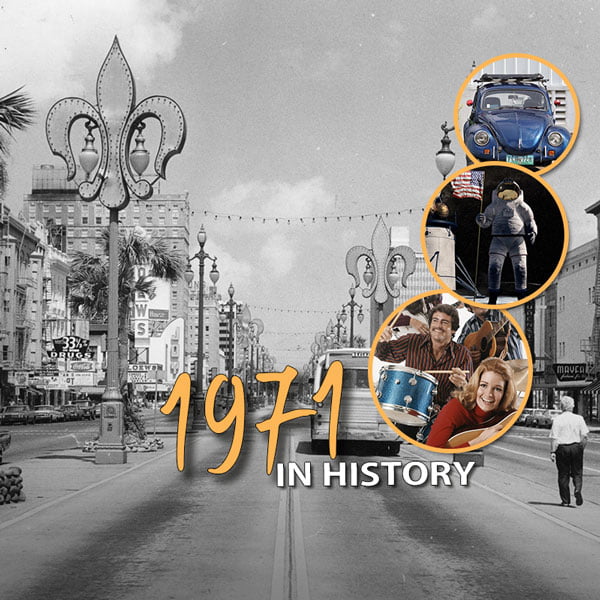
1971 IN HISTORY - WHAT HAPPENED IN 1971?
FDN HISTORY >
Do you sometimes look back at your life and wonder at how things have changed?
A lot can happen in fifty years. Even twenty, five, or one year, nowadays.
Some of the delicacies you enjoyed as a child are no longer available. Several friends and family members have passed on. Towering skyscrapers sprawl over what was once a lush, green meadow.
The 1970s, for example, brought forth bellbottoms, magnificent advances in space technology, and the hippy era.
How our world has changed dramatically since then!
Yet I often wonder, “Did the changes really improve our quality of life? Are we living in a safer world?”
1971 VS OUR WORLD TODAY
SMOKING KICKED TO THE CURB
In 1971, people recognized the dangers of smoking, with the USA the first to ban cigarette adverts on television. It led to a considerable outcry among cigarette barons, who are still crying today.
Currently, New Zealand hopes to be tobacco-free by 2025, and Finland by 2040. The fight against smoking is continuing, but sadly, illicit trading is expanding in leaps and bounds.
ABORTION, RACISM, GENDER INEQUALITY & HOMOSEXUALITY ADDRESSED FOR 1ST TIME ON TELEVISION
In 1971, the ground-breaking television sitcom All in the Family aired. The show was among the first to touch on gay issues, abortion, racism, and gender inequality. Back in the day, issues such as these were considered taboo on television.
50 years on, and these subjects are commonplace. Nobody seems to raise an eyebrow anymore, with humanity seemingly accepting and respectful of everyone else’s differences. Or so we thought until the pandemic hit in 2019, and two years on, we disappointingly see the flames of racism still burning hot everywhere in the world, threatening to consume communities and countries.
CRICKET – A RICH VEIN OF GOLD DISCOVERED
In 1971, the first-ever one-day international cricket match was played between England and Australia.
The one-day format of the game spread like wildfire, and the first World Cup was staged in England in 1975. The West Indian team took the cup home that year under the leadership of Clive Lloyd.
Today, one-day cricket has evolved into one of the most lucrative forms of cricket, with a worldwide following. Once sports fans and developers realized the 50-over format worked well, the game was expanded further into a lucrative 20-over format.
In the second year of Covid-19, limited-over cricket is an income lifeline for cricket players and cricketing countries alike.
SPACE – THE RACE IS ON!
In 1971, Alan Shepard and the Apollo 14 crew undertook the third and last manned trip to the moon. Even while encountering initial technical difficulties, the mission proved a success.
Unfortunately, we’ve never been back. Nationally, we are still at square one. No lunar bases were established, and the momentum of returning to the moon has withered to a complete standstill.
Yet one private company, SpaceX, took up the challenge, developing reusable rockets and new technology to help accelerate humankind’s travel to the moon and beyond.
Today, private space travel is progressing in leaps and bounds, with billionaires vying for the opportunity to introduce space tourism to the general public.
The exploration of Mars has started, and an international space station is being built.
In 1971, the USSR made a quantum leap when the space module Soyuz 10 docked with the world’s first space station, Salyut 1. The Russians lost the race to the moon but were the first to create a space station around Earth.
50 years later, the Russian space station is history; it ran out of fuel within six months and burned out in the atmosphere.
To date, more than 1,600 Soyuz launches have taken place, and a new, multi-nation space station is under construction.
In 1971, the crew of Apollo 15 drove in a Lunar Roving Vehicle (the Moon Buggy) on the surface of the moon. It was the longest stay on the lunar surface and included three moonwalks.
Today, we know that was the second-last visit of a human to the moon. Fortunately, in 2021, the first man-made, unmanned ‘helicopter’ flew on the surface of our neighbouring planet, Mars.
WORLD SAFETY DURING 1971
1971 was part of an era where hijackings were the order of the day. No less than ten major hijackings happened that year. One of the most significant occurred in January when two Kashmir separatists hijacked an Indian Fokker F27 passenger plane.
The passengers were all released, but the plane was blown up. That incident caused a five-year ban on air travel between India and Pakistan. 2021, and only isolated instances of plane hijacking have occurred. Most major airlines have vast security systems in place to safeguard planes and passengers.
The last devastating hijackings were the 9/11 attacks on the World Trade Centre, and we know what turmoil that sparked.
In 1971, the south tower of the World Trade Centre reached a height of 415 meters, becoming the second-tallest building in the world at the time. The twin towers became a landmark in the New York landscape.
50 years on, and the towers are no more. In the devastating attacks on 9 September 2001, these landmarks were demolished. It sparked a war in Afghanistan, which resulted in the 2011 killing of Osama Bin Laden, the mastermind behind the attacks. He was on the run for some ten years. Today, fear of worldwide terror is still with us.
A TECHNOLOGICAL JUMP TO THE FUTURE
In 1971, the world’s first eBook was published. For most, a computer was a foreign object and an eBook of little significance. Michael Hart posted the world’s first eBook, The US Declaration of Independence, on the mainframe of the University of Illinois.
In 2021, we can look back at Michael Hart’s work as the origin of Project Gutenberg. Today, eBooks are part of our everyday lives.
In 1971, Intel released the world’s first microprocessor, the Intel 4004.
Today, we can’t live without a cell phone or laptop. Intel currently has a market share of 60% of the world’s processors. Even with strong competition from AMD, it remains the market leader and a frontrunner in the race for a so-called supercomputer.
A LANDMARK IN WORLD TOURISM IS BORN
In 1971, Walt Disney’s brainchild finally came to life with Disney World opening its doors in Orlando, Florida.
Today, the Disney World complex is one of the USA’s major tourist attractions and a must-see for everyone visiting the States. If Disney should look back, he’d be amazed at how theme parks have expanded beyond even the wildest of his dreams.
Some people are looking back at the good old days with fond nostalgia, while some are looking forward to an even more exciting future.
Let’s take the good from the past and build on it to create an even stronger and more exciting future.
1971 IN HISTORY - WHAT HAPPENED IN 1971?
FDN LIFE ARTICLE >
SHARE
CONTENT
- Editor's Notes >
- BRANDSON DOES IT! > A New Dawn In Space Travel - Branson Beats Musk & Bezos To It! In Spacecraft Unity22
- SOFIA REGO > Holistic Health & Wellbeing ENTREPRENEURSHIP
- 1971 > In History
- CHATBOT & LIVECHAT SOFTWARE > For Websites With WPBOT FOR WORDPRESS By Quantum Clloud
- JENNI LEIVO > Life As a Digital Nomad
- 7 BUSINESS OPPORTUNITIES > IN SPACE - For Entrepreneurs, Professionals & Everyday Jane & Joe's
FDN LIFE >
AUTHOR
Ben Masterson
SUBSCRIBE TO
FDN LIFE NEWSLETTER!
Join our mailing list to receive the latest news, information, and special offers.



